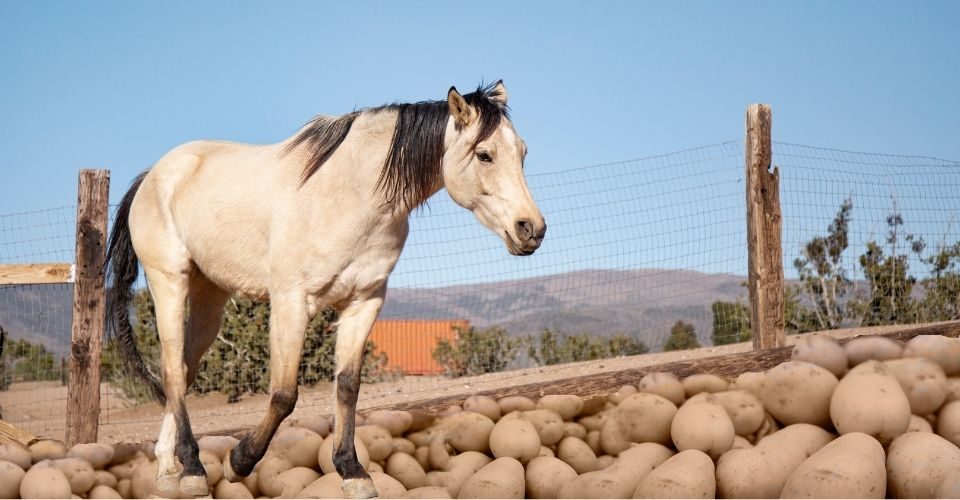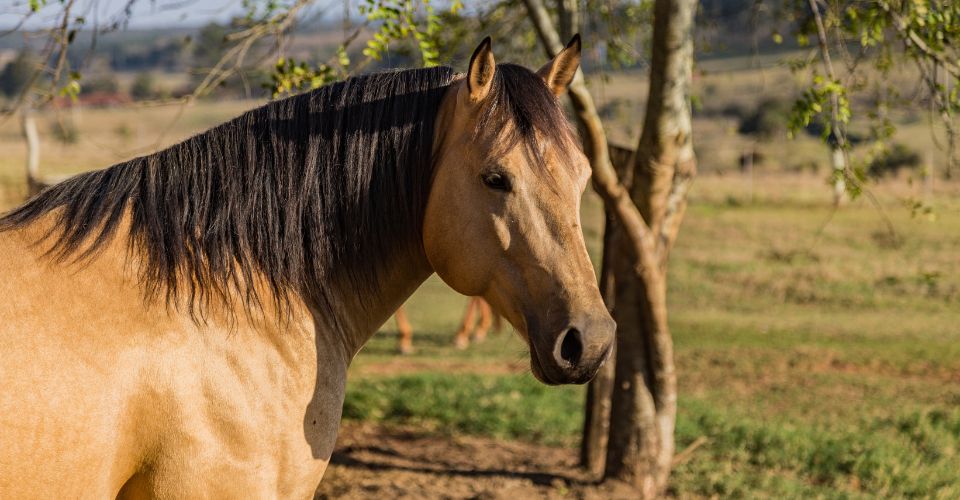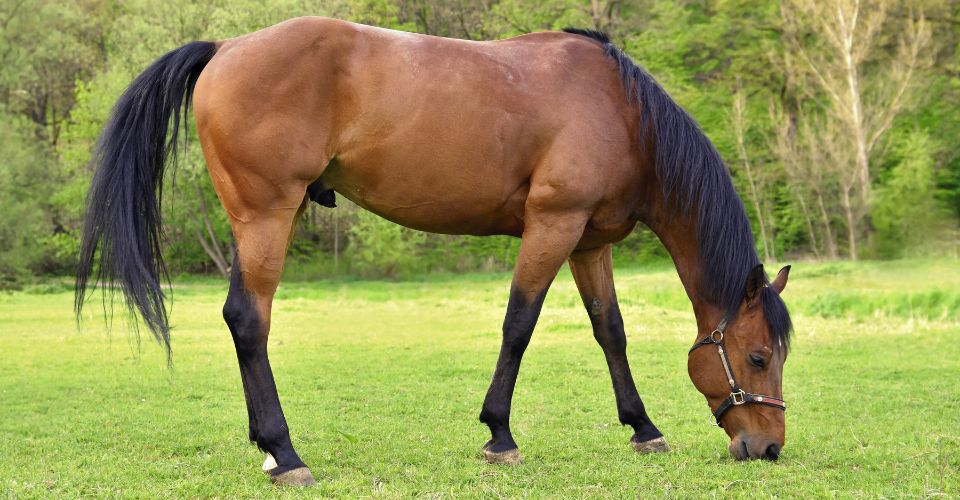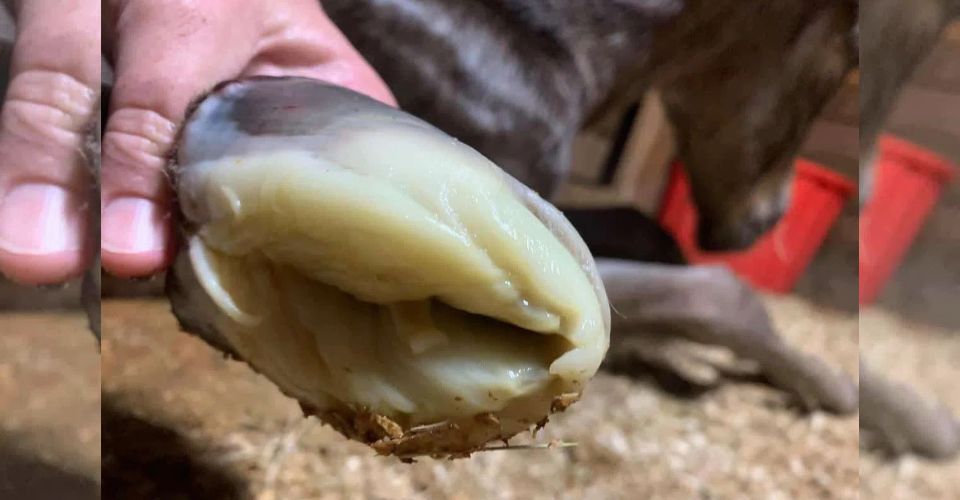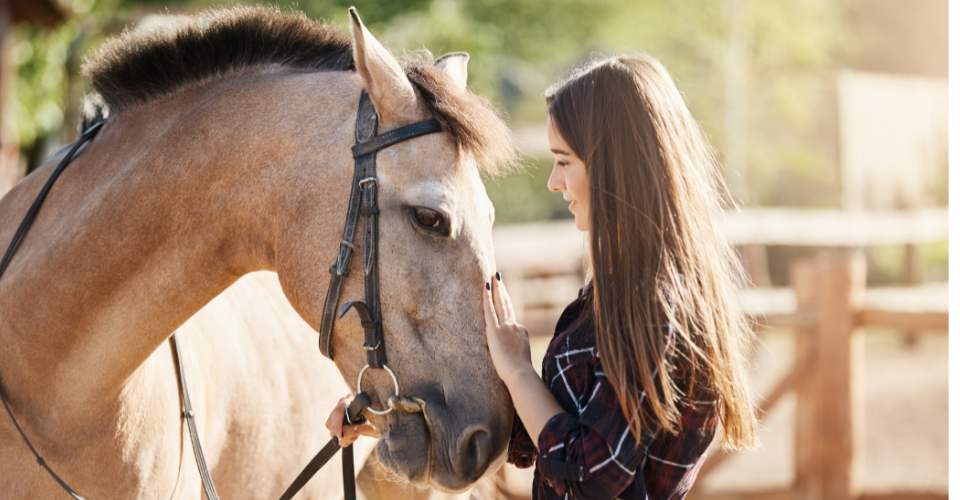Potatoes are among the best and most consumed vegetables in the world. We love them, especially when presented in the form of snacks like French fries, chips, tater tots, gnocchi, and a lot of other stuff.
But since potatoes are quite handy and snacking edible items, you might have thought about offering some of them to your hoofy friend. You are, without a doubt, absolutely into this vegetable, but can horse eat potatoes? What are the risks?
Read the full blog to comprehend the answer effectively.
Can Horses Eat Potatoes?
No, potatoes are toxic to horses.
Horses should not eat potatoes – not even in moderation – because of their poisonous and fattening effects on equines. Being a nightshade family member, potatoes can even be toxic to humans when consumed in excess, especially green or sprouted potatoes.
Why Potatoes Are Bad For Horses?
Here are two main reasons you can share potatoes with your equine friend.
Toxicity
Potatoes contain two kinds of glycoalkaloid toxins – chaconine and solanine – that pose a toxicity risk to horses as well as humans. You must be thinking that when it is okay for us to munch on potato snacks all the time, then why we are not affected by the natural toxins present in potatoes.
Well, when cooked, these toxins break down, making potatoes safe for human consumption. Cooked potatoes also pose a lesser degree of toxicity threat to horses. On the other hand, uncooked potatoes pose a toxicity risk to both humans as well as horses.
Besides, when humans swallow any toxic item like potatoes, they might vomit, significantly decreasing the symptoms and long-term impacts. Horses cannot throw up due to stronger esophageal sphincters and are thus vulnerable to poisoning as they cannot get the toxins out of their bodies.
Nightshade Family Does Not Get Along With Horses!
Veggies belonging to the nightshade family of vegetables are high in alkaloid toxins – solanine and chaconine – making them toxic to horses and livestock. Therefore, you should refrain from feeding potatoes, tomatoes, bell peppers, and other nightshade veggies to your horse.
Obesity
Besides toxicity, potatoes are also high in starch, and hence, have a high content of carbohydrates. A diet rich in carbohydrates increases the risk of obesity in horses.
If truth be told, potatoes are more fattening for horses than for human beings because the former have not evolved to run on too many carbohydrates. As a result, they easily get obese and gain unnecessary pounds. Obesity will not only lead to many other health issues but will also interfere with the learning abilities of your horse. If you have a dressage horse, gaining extra pounds is certainly going to affect his performance in shows.
Are Potatoes Safe for Horses in Any Form?
Potatoes, regardless of their form, are toxic or at least unhealthy for horses. The main ways of serving horses potatoes are raw, cooked, or processed. To understand better, see the detailed explanation of each way of serving below:
Raw Potatoes: Can Horses Eat Raw Potatoes?
Raw potatoes are toxic to not only horses but also humans as they contain a high amount of unbroken toxins – solanine and chaconine. And if raw potatoes are unpeeled, it would be even more toxic as potato peelings contain around ten times more solanine than potato flesh.
Cooked Potatoes: Can Horses Eat Cooked Potatoes?
Based on the above discussion, you might think that cooked potatoes must be okay for your horse because the toxin solanine is broken and no more poses the toxicity risk. However, despite safe solanine levels, it is strongly advised that you do not give potatoes to your horse, as it is always a possibility that cooked potatoes may still contain some level of unbroken solanine. Plus, even if solanine is completely removed, the fattening aspect of potatoes is still there.
In addition, if potatoes are cooked in oil instead of using steam or water, they turn out to be even more fattening.
Processed Potatoes: Can Horses Eat French Fries or Chips?
No, horses cannot eat french fries or chips. Processed potatoes such as French fries and chips contain a lot of additives and chemicals that can affect the digestive system of your horse.
Remember that not just potatoes, any processed food containing such ingredients, would be unhealthy for your horse.
Caution!
Horses are also prone to eating naturally grown potatoes. Since potatoes are wild plants, it is necessary to look for any grown potatoes at your farm and remove them immediately.
Potato Peels: Can Horses Eat Potato Peelings?
No! Potato peels are toxic to horses.
Potato peelings contain even a higher concentration of toxins, making them more toxic than potato flesh.
Do Horses Like Potatoes?
Typically, horses do not like the taste of nightshade vegetables, and they naturally do not prefer them over the regular diet they get from grazing. Since they are bitter, horses usually avoid them.
Nevertheless, be aware that it is possible for horses to be tempted by nightshades. Just have a look at the video below and see how much this horse is savoring the taste of chips!
What Are the Symptoms of Potato Poisoning in Horses?
Because of their large size, eating only one or two potatoes usually does not impact horses’ health. Nonetheless, if they eat many of them, multiple signs of potato poisoning can surface within a couple of hours, and their severity will depend upon the number of potatoes ingested.
As for the small number of potatoes, the following mild symptoms can occur:
- Abdominal swelling
- Colic
- Cramping
- Diarrhea
- Excessive drooling
- Excessive swelling
If your horse has consumed a large number of potatoes, the following intense symptoms may show up:
- Confusion
- Decreased appetite
- Respiratory distress
What to Do if Your Horse Has Consumed Potatoes?
First of all, if your horse has consumed only one to two potatoes, it is nothing to fret over. As discussed earlier, a small quantity of this vegetable is certainly not a problem for horses to handle – thanks to their big size. However, if he has eaten a lot of them, you should contact a vet immediately, especially if those potatoes were raw. Also, it is better not to wait for the signs of potato poisoning to show up.
The faster you take your horse to the vet, the earlier they might be able to treat the poisoning, saving your horse from any lasting damage and long-term issue undermining his health. The treatment usually includes activated charcoal and neostigmine. That said, you should never try to treat potato poisoning yourself; instead, you should immediately take your horse to a vet.
What Are the Alternatives of Potatoes for Horses?
If you are trying to find a suitable replacement for potatoes for your horse, you can try the following vegetables:
- Sweet Potatoes: It is a safe and healthy option with numerous benefits. But given the high starch content, only feed in moderation.
- Cucumbers: cucumbers make a healthy and refreshing snack for horses.
- Carrots: Delicious and nutritious, carrots are traditional favorites of horses.
- Turnip: It is a safe root vegetable for equines. It increases overall health due to its nutritional components.
- Swede (Rutabaga): It is safe; however, it is advisable to cut it into small pieces to avoid the risk of choking.
Are There Any Benefits of Potatoes for Horses?
Although potatoes are indeed harmful to horses to consume, they do have certain beneficial effects as well. The table below enumerates the healthy nutrients, their quantity in one small potato (170 g), and their outcome.
Nevertheless, please note that these nutrients cannot nullify the harmful threat posed by solanine. Therefore, the presence of these nutrients does not justify that horses should eat potatoes.
| Nutrient | Quantity | Beneficial Effect on Horses |
|---|---|---|
| Calcium | 20 mg | It is required for neuromuscular functioning, cell signaling, and blood clotting. It also maintains the structural integrity of the skeleton. |
| Fiber | 3.7 g | It keeps the gut full. Moreover, it gets soaked easily and keeps the horse hydrated by acting as a water reserve. |
| Iron | 1.3 mg | It is vital for the transportation of oxygen in the body. Since a horse’s body is 60% hemoglobin, iron becomes especially important. |
| Phosphorus | 50 mg | It is vital for skeletal health and bone development. It is also essential in repairing body tissues and cells. Furthermore, phosphorus makes up about 14 to 17 percent of horses’ skeleton. |
| Potassium | 715 mg | It plays an important role in normal muscle contraction and relaxation. It also controls the osmatic pressure. |
| Proteins | 4.3 g | Proteins help horses maintain their immunity, regulate metabolism, transport nutrients through the bloodstream, and overall health. |
| Vitamin B6 | 0.5 mg | It is important for metabolic function in horses. It also controls blood sugar, muscle development, joint health, and hormone production. |
| Vitamin C | 33 mg | It fights against the free radicals and neutralizes them. It also plays a role in keeping a horse healthy during times of stress. |
Conclusion: Can Horse Eat Potatoes?
No! Horses cannot eat potatoes. Potatoes contain glycoalkaloid toxins – chaconine and solanine – which are toxic to horses. Besides, potatoes are loaded with starch, which increases the risk of obesity and related health issues in horses.
Thanks to the natural tendency of horses to say no to nightshade vegetables, they are less likely to consume potatoes; however, you need to be vigilant of any sign of potato poisoning.

